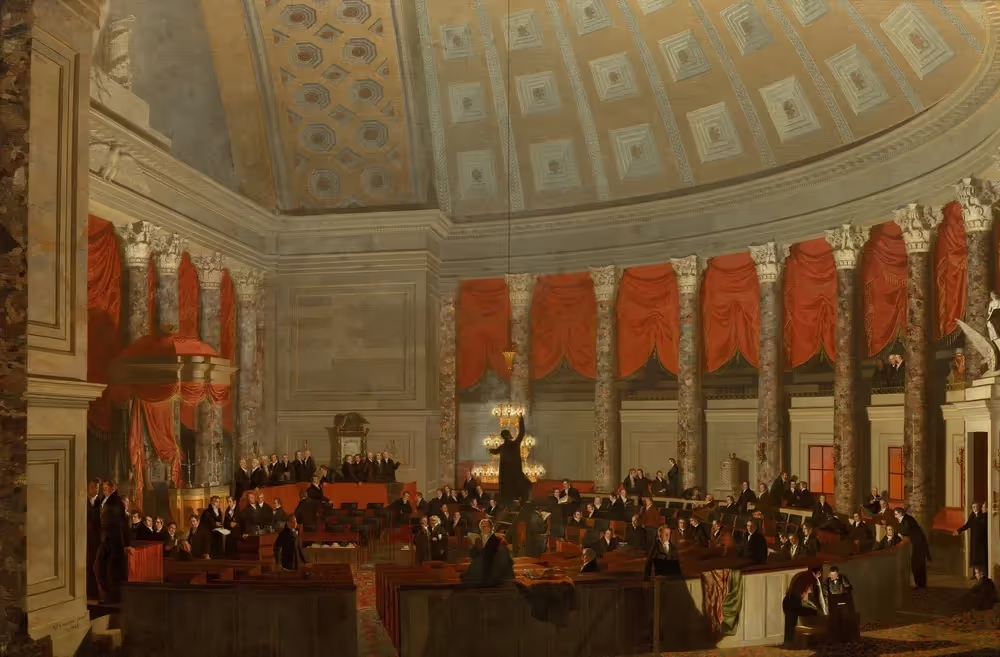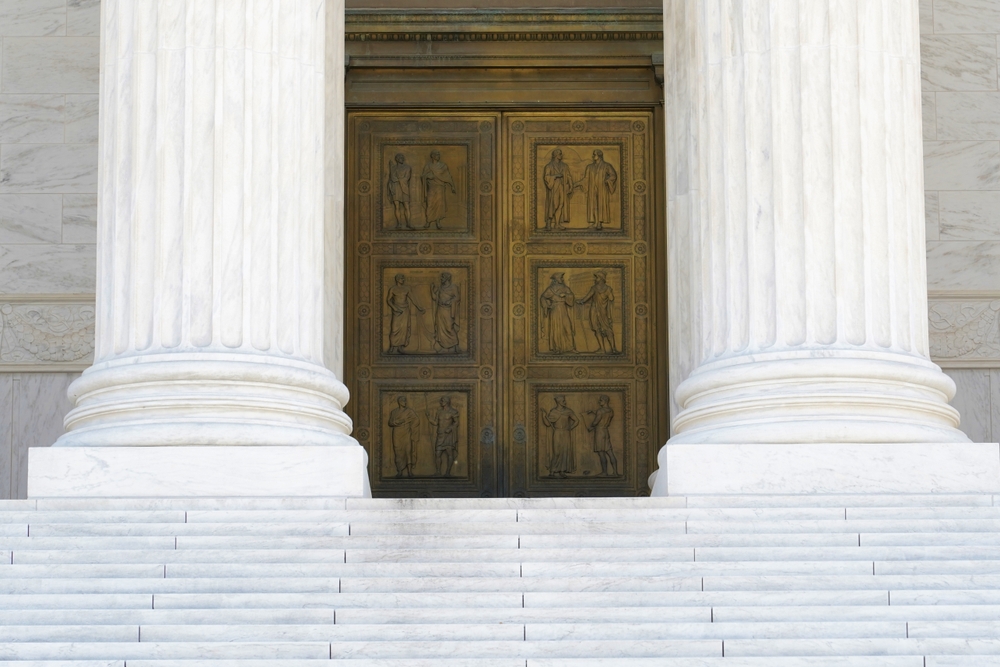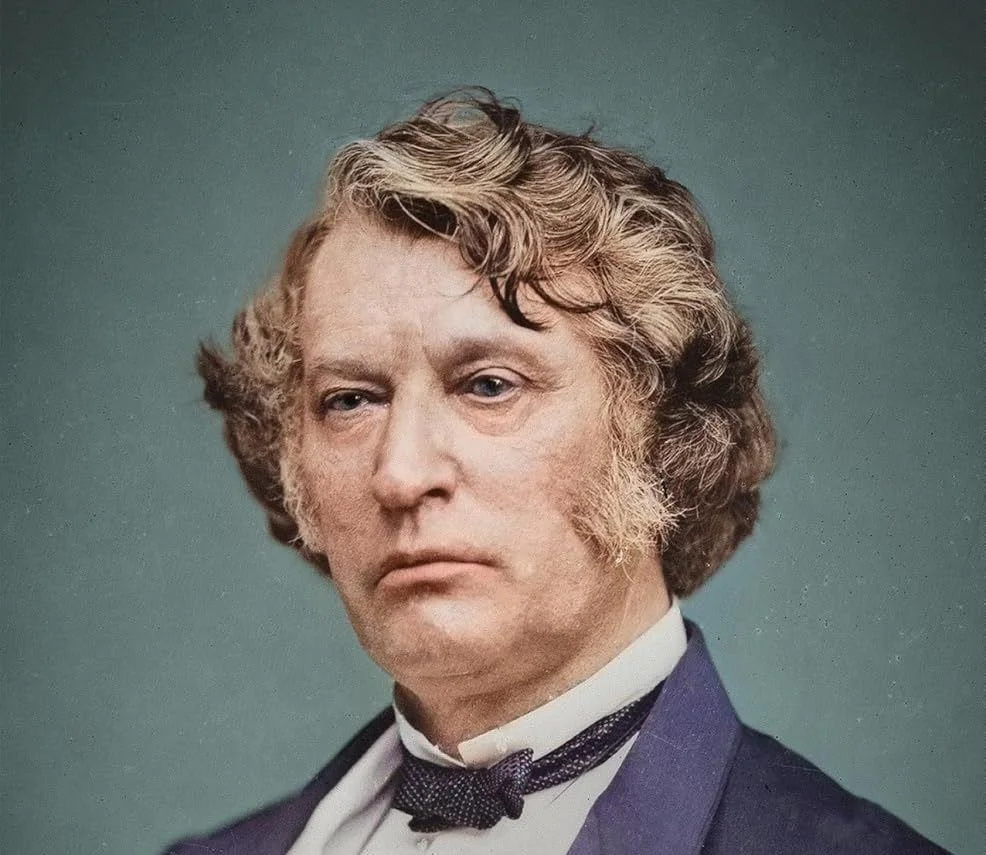
The American Constitution: Covenant or Curse?
Where Yuval Levin is grateful for the Constitution bequeathed to us by the Founders, Erwin Chemerinsky declares “our reverence for the Constitution has kept us from seeing how much of it has become the root of the problem.”
Could two books be more opposed in political outlook and sensibility than Yuval Levin’s American Covenant and Erwin Chemerinsky’s No Democracy Lasts Forever? The contrast is captured in the books’ subtitles: Levin’s How the Constitution Unified Our Nation—and Could Again and Chemerinsky’s How the Constitution Threatens the United States. Levin has written a graceful love letter, and Chemerinsky has penned a bitter breakup. Where Levin finds reason to be grateful for the Constitution bequeathed to us by the Founders and fully approves of Federalist 49’s protective attitude toward the Constitution, Chemerinsky declares “our reverence for the Constitution has kept us from seeing how much of it has become the root of the problem.”
That is not to say that Levin regards the Constitution as perfect. He acknowledges that it is a product of negotiation and compromise, which he argues is not aimed at truth per se, but at accommodation in the service of unity. Even that, however, he turns into a political virtue that he believes we have abandoned in our politics. Levin’s recommendations for reform are aimed at improving the performance of our political institutions, all of which are grounded in recovering for ourselves the framer’s reasons for the constitutional framework they erected. His most ambitious recommendation is that Congress should increase the size of the House of Representatives, by perhaps 150 people, better to reflect the diverse interests and views of the country. That is the one reform that Chemerinsky agrees would be an improvement. But it stands out in Chemerinsky’s recommendations as his least ambitious proposal, as his reform agenda is aimed at the Constitution itself, which he argues, in the tradition of Progressive critique, is an obstacle to democratic values, effective governance, and social cohesion.
Like FDR, Chemerinsky would like to see the Supreme Court re-interpret the Constitution to declare the Electoral College unconstitutional for being insufficiently democratic, and he would like to see Congress remove reapportionment from state legislatures and assign that task to independent commissions. He would also like to see Congress abolish the filibuster, which he considers insufficiently democratic, and legislate term limits for the Supreme Court, which he also considers insufficiently democratic. Not expecting any of that to be done this side of paradise, Chemerinsky turns to constitutional reform via the insufficiently democratic amendment process. Perhaps we could correct by means of amendment what he identifies as the “worst defects in the Constitution,” ridding the polity of the Electoral College and replacing it with direct nationwide popular election, and removing the insufficiently democratic provision for two senators per state, in favor of proportional representation in the Senate as in the House.
The amendment process is too difficult for reform; however, Chemerinsky explores the possibility of our need for a new constitutional convention to write a new, sufficiently democratic framework for governing ourselves. This would require ignoring the Constitution’s procedures and providing for ratification by a majority of American voters. Finally, if that seems unlikely, as Chemerinsky thinks it is, we need to consider what we might call the nuclear option – the breakup of the Union into two or more separate nations. Although he does not favor this path of reform, he devotes a significant portion of his book to considering how secession could be accomplished, and he argues that there is nothing in the Constitution that prohibits such an outcome. At the very least, he seems very open to a return to something like the Articles of Confederation. His book was published before the 2024 election, and he writes, “I expect that if we ever get a conservative Republican president and a Republican Congress, calls for secession in California and some other states would go from fringe to mainstream.” We await this development.
Levin does something that Chemerinsky does not, and that is to do a deep dive into the political and constitutional thought and expectations of the framers. He writes as a professed conservative and a Madisonian, with significant support from Hamilton. His book is praised by respected scholars, including Gordon Wood and Jeffrey Rosen, as well as by Governor Spencer Cox of the state of Utah. I understand why. Levin has a real talent for reproducing the institutional thinking of the framers, to capture the way our constitutional institutions were meant to work and the ends they were intended to serve. He laments how each of our three branches has wandered from performing the duties and activities that are peculiar to each, thereby corrupting the separation of powers and the division of sovereign authority between the national and state governments.
More than any other influence, Levin blames the Progressivism of Herbert Croly, Teddy Roosevelt, and Woodrow Wilson, the sort championed by Chemerinsky, for much that he believes has gone wrong with our institutions. He argues that our institutions, far from being reactionary or Thermidorian, are fundamentally democratic, more so even than the Declaration of Independence. There is plenty of evidence in the writings of the framers that they regarded their work as republican, devoted to majority rule while protecting minority rights and individual liberty. What distinguishes Levin’s book is its overarching thesis that the Constitution is, in fact, a “unity framework.” Progressives view unity as “the natural state of our society,” which is fractured by special interests and selfish concerns. Only a centralized authority, party government, and a presidency understood to be the representative of the whole people can tamp down the divisions in the society. To this, Levin responds that Madison was correct in Federalist 10. In a free society, disagreements rooted in human nature – passions, interests, and opinions – fragment society into factions, with partial views of the common good.
This is a permanent reality. As factions constitute a threat to social peace and just government, controlling their effects is crucial to the success of a republic. We know Madison’s solution to the factional problem: Extend the republic over a large enough territory, encompassing a multiplicity of interests, that makes it unlikely that a majority faction, concerted around a common opinion or interest (historically the destroyer of popular government) would exist. Instead, coalitional majorities, in constant flux, would constitute governing authority. Bargaining, contention, negotiation, persuasion, accommodation, and compromise are incentivized by the need to form majorities among diverse interests and policy preferences, and this shapes the electoral process as well as the work of Congress, the representative body as Levin understands it. When it works well, consensus rules over factional majoritarian force. Put briefly, Levin’s Constitution is intended to “forge common ground” where it naturally does not exist. Or as he puts it in our highly divided and partisan time, “as a framework for unity, the Constitution functions as a means of rendering disagreements more constructive,” or as he sometimes asserts, a means of helping us to disagree better. Unity is meaningful cohesion, not agreement.
My views on the Constitution closely align with Levin’s, and so I am going to devote the remainder of my survey to aspects of his argument that give me pause:
First up: Levin asserts that “the centrality of Congress is essential to the legitimacy of the regime and to its claim to republicanism.” Congress’s centrality, he writes, is due to the fact that “only Congress is designed to be representative of [the people].” “Republican government is fundamentally legislative government.” Still quoting, “[the framers] assumed and asserted the supremacy of the legislature.” Is this correct? Levin alerts us to Publius’s concern with the legislature’s propensity to dominate the rest of the government, and he describes how “the chief appeal of the separation of powers was clearly to restrain the legislature.” We need to add here that, as Herbert Storing has written in What the Anti-Federalists Were For, the division of governing power into three branches was “aimed primarily at the efficient performance of certain kinds of tasks.” Does legislative supremacy survive the constitutional framework? I think it is more accurate to see that our system is a rejection of the common notion, found in Locke, for example, that the legislature is sovereign. Rather, the legislature is a mere creature of the Constitution, which both apportions and limits legislative power as one of the governing instruments in a complex constitutional balance. Levin is drawn to legislative supremacy because of Congress’s representative character. But is he correct that only Congress is representative, and thus, by implication, the only truly republican body in the national government?
As Publius writes, a republic is a form of government in which all power is derived directly or indirectly from the people. In that sense, all three branches are understood to be representative. Elsewhere in the book, Levin writes that “the president, as a single individual, cannot be representative.” Yet Madison, Levin’s muse throughout the book, wrote in his Report on the Virginia Resolutions, that “in the United States, the executive magistrates are not held to be infallible, nor the legislatures to be omnipotent; and both being elective, are both responsible.” And again, in his 1830 letter rejecting the constitutionality and wisdom of nullification, he highlighted “the responsibility of the President to the people of the U. States”—not to Congress only, but to the American people. That notion of responsibility seems to me to be inseparable from the president’s representative duty. Finally, let’s not ignore Hamilton’s argument in Federalist 72 that a president’s eligibility for reelection enables the office holder, from the love of fame, to “undertake extensive and arduous enterprises for the public benefit”—hardly an errand-boy notion of the president’s constitutional duties.
My second and final reservation concerns Levin’s overall project. Levin wishes to elevate the American republic from its current worrisome cultural and political divisions, and to reinvigorate our governing institutions as places where consensus is built and moderation reigns. This leads him to consider the character of Americans. “At the heart of our republicanism is an ambitious, demanding ideal of the human being and citizen.” Furthermore, “republican liberalism is . . . ultimately founded in a substantive vision of human flourishing and demands respect for human dignity and recognition of human needs. Its purpose is not just social peace but social order—a mode of living together so as to enable all to better thrive.” The pursuit of the common good in a free, diverse society “requires of the citizen selflessness, accommodation, restraint, deliberation, and service.” “A defense of constitutionalism in America is inherently a defense of this republican anthropology.”
Because of this understanding of citizenship and of the purpose of government, Levin is quite critical both of Madison and Hamilton for their “cynical” and “Machiavellian” descriptions of what they regarded to be realities of human nature and of politics. “Ambition must be made to counteract ambition” in Federalist 51, and in Federalist 10, “If the impulse and the opportunity be suffered to coincide, we well know that neither moral nor religious motives can be relied on as an adequate control.” The writings of the Founders are replete with expressions of this alternate anthropology. Selflessness is not spoken of. Yes, there are also many other expressions of the need for, and the presence of, adequate civic virtue among Americans to justify a level of confidence in the republican experiment.
But conservatives preached the noble character-shaping approach to politics for decades (see, e.g., George Will’s Statecraft as Soulcraft), and it failed utterly even to slow down progressivism. Levin’s book was published in June 2024. Donald Trump does not fare well in it, to say the least. His has been a “lifetime of cultural performance art.” Levin quotes approvingly two scholars of Congress who wrote, “rather than translating people’s grievances into action, Trump’s performances were offered as their only reward.” Perhaps something more will need to be said in the next edition about Trump as president, as a failure to act no longer can describe his presidency.
Speaking very politically, allow me to suggest that the 2024 election reaffirmed the Founders’ reliance, not on civic virtue, but on the deep bedrock of the commercial republic to begin the rollback of the worst excesses of the progressive left. In its relatively unimpeded march to the left, progressivism finally revealed itself to be utterly detached from, or even hostile to, the everyday concerns of a great many citizens in our commercial republic. The fact is that the profoundly utopian DEI/CRT project may have come to permanent grief due to the price of eggs. Not just inflation (“transitory”) but the simple management of everyday public affairs — even San Francisco has now discovered that the left’s utopian project has basically destroyed its downtown and is reacting accordingly. These concrete, nitty-gritty concerns of citizens in the commercial republic completely subverted the left’s effort to make the recent election a grand ideological contest about “our democracy,” settler colonialism, pronouns, and other ideological concerns. Commerce has a marvelously corrosive effect on utopian projects. And commerce has its own way of producing its own kinds of virtues, in some ways similar to, but by no means as “pure,” as the virtues the ancients and the Anti-Federalists hoped to see. Self-interest, rightly understood, is as Tocqueville perceptively observed. Levin nowhere seems to acknowledge that critical precondition for getting us to where he would like us to be. Nonetheless, we may be at the beginning of a realignment of sober expectations, judging from the demographic shifts among voter preferences.
My friendly suggestion to Levin: Place more emphasis on the commercial nature of the republic as the key to its flourishing. It’s the so-called bourgeois virtues that form the American soul more than our understanding of, or participation in, our governing institutions. He quotes Madison and Federalist 10 often, but he doesn’t quote Madison saying that the protection of the different and unequal faculties of acquiring property is the first object of government. Nor does he address the transformative effects of Hamilton’s financial plan, which put us on the path to prosperity and unleashed our productive capacities (yes, the acquisitive part of our nature). He may consider that too low to praise. Hamilton, however, regarded it as a liberation of the human spirit, expanding the objects for which Americans could devote their restless energies and broaden their interests and engagement with their fellow citizens and the larger world beyond what was possible in Jefferson’s agrarian economy. Silicon Valley comes to mind, as the dynamism of invention, tolerance of risk, and personal agency, as well as the sheer thrill of adventure, appeals to them. Here’s Hamilton in Federalist 12:
By multiplying the means of gratification, by promoting the introduction and circulation of the precious metals, those darling objects of human avarice and enterprise, it serves to vivify and invigorate the channels of industry, and to make them flow with greater activity and copiousness. The assiduous merchant, the laborious husbandman, the active mechanic, and the industrious manufacturer, all orders of men look forward with eager expectation and growing alacrity to this pleasing reward of their toils.
Richard Brookhiser was right to say of Hamilton that the American Dream is his legacy. And that dream is a moderating influence in our politics, which is what Levin seeks.
I’ll conclude with praise for Levin’s promotion of federalism, a constitutional arrangement that has been severely compromised by the centralization of power in the federal government. A “more robust federalism,” Levin argues,
would allow us to be more cohesive, less divided, and more at home in our society. By reducing the quantity of divisive questions that need to be resolved at the national level and providing some space for a diversity of answers to such questions . . ., federalism offers us a framework for political life exceptionally well adapted to the challenges our society now confronts.
Perhaps Chemerinsky would agree at least in part, as he suggests in his discussion of secession that “power could radically devolve to the states for most things, while retaining a national government for the military and foreign affairs.” It strikes me that if the national government stuck to protecting rights as originally understood, it could counter racism but avoid the dangers of identity politics because it would not be attempting to impose its winner-take-all idea of community, which, in a free society, is always doomed to fail. (Again, see Federalist 10.) You can't create a community based on intractable differences. Federalism means you don't have to try.
Bradford P. Wilson is the James Wilson Distinguished Visiting Scholar, Center for Constitutional Studies, Utah Valley University; Trustee, James Madison Memorial Fellowship Foundation.
Constitutionalism

Amicus Brief: Hon. William P. Barr and Hon. Michael B. Mukasey in Support of Petitioners
Former AGs Barr and Mukasey Cite Civitas in a SCOTUS Brief

Rational Judicial Review: Constitutions as Power-sharing Agreements, Secession, and the Problem of Dred Scott
Judicial review and originalism serve as valuable commitment mechanisms to enforce future compliance with a political bargain.

Supreme Court showdown exposes shaky case against birthright citizenship
Supreme Court will hear challenges to Trump's order ending birthright citizenship, testing the 14th Amendment's guarantee for babies born in America.

Slavery and the Republic
As America begins to celebrate its semiquincentennial, much ink has been spilled questioning whether that event is worth commemorating at all. Joseph Ellis’s The Great Contradiction could not be timelier.

Two Hails For The Chief’s NDA
Instead of trying to futilely plug the dam to stop leaks, the Court should release a safety valve.


.avif)










.avif)



